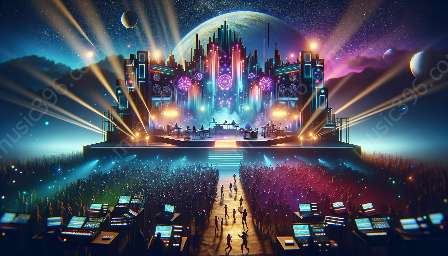The video game industry has opened up new and exciting avenues for electronic music composers. With the increasing demand for immersive soundtracks, electronic music has become an integral part of video games, creating numerous professional opportunities for composers in this genre.
Electronic Music in Video Games
Electronic music has been an essential component of video game soundtracks for decades. Its integration with visuals and gameplay elements can greatly enhance the overall gaming experience. From ambient soundscapes to pulse-pounding beats, electronic music offers a diverse range of sonic possibilities that can cater to various gaming genres.
As video games continue to evolve technologically and artistically, the role of electronic music composers becomes increasingly significant. Their ability to craft compelling and memorable soundscapes directly impacts player engagement and emotional resonance within the gaming environment.
Professional Opportunities
For electronic music composers, the video game industry presents a wealth of professional opportunities. These opportunities extend beyond traditional music composition, encompassing a range of roles and responsibilities within game development:
- Composer: Electronic music composers can create original soundtracks for video games, tailoring their compositions to match various in-game scenarios, environments, and narratives. This role involves not only musical creativity but also a deep understanding of interactive and adaptive music systems.
- Sound Designer: Composers with expertise in electronic music can also excel as sound designers, shaping the audio landscape of games through the use of sound effects, ambient textures, and dynamic audio implementation. Sound designers play a crucial role in enhancing immersion and audio realism within games.
- Audio Director: Experienced electronic music composers may pursue leadership positions as audio directors, overseeing the entire audio production process for video game projects. This role involves managing audio teams, defining artistic direction, and ensuring the cohesion of the sonic experience with the game's creative vision.
- Interactive Music Specialist: With the rise of interactive and adaptive music systems in video games, there is a growing demand for composers who specialize in creating music that dynamically responds to player actions and in-game events. This specialized role requires a deep understanding of musical implementation techniques and game audio middleware.
- Collaborative Opportunities: Electronic music composers can collaborate with game developers, audio engineers, and other creative professionals to expand their skill set and contribute to multidisciplinary projects. Collaboration within the video game industry offers composers the chance to leverage their expertise in electronic music within a dynamic and innovative context.
Adapting to the Gaming Environment
Successful electronic music composers in the video game industry are adaptable, versatile, and technically proficient. They must be adept at adapting their musical styles to suit various game genres, from action-packed adventures to atmospheric puzzles. Furthermore, composers must have a strong grasp of audio middleware, game engines, and implementation tools to ensure seamless integration of their music into the gaming environment.
Understanding the interplay between gameplay mechanics, narrative beats, and emotional storytelling is essential for electronic music composers seeking to make a meaningful impact within the video game industry. By aligning their creative vision with the interactive nature of games, composers can craft soundtracks that resonate deeply with players and elevate the overall gaming experience.
Career Development and Specialization
Aspiring electronic music composers looking to enter the video game industry can benefit from acquiring specialized skills and knowledge. This includes gaining proficiency in audio middleware platforms such as Wwise and FMOD, as well as honing their understanding of interactive music composition techniques.
Furthermore, participation in game jams, networking with game developers, and building a strong portfolio of original compositions can significantly enhance a composer's prospects within the industry. Embracing ongoing learning opportunities, such as attending conferences and workshops focused on game audio, can further enrich a composer's professional development.
Conclusion
The intersection of electronic music and the video game industry presents a vibrant landscape of professional opportunities for composers. With a deep understanding of game audio technology, a versatile approach to musical composition, and a passion for immersive storytelling, electronic music composers can carve out rewarding careers within this dynamic and innovative sector.


